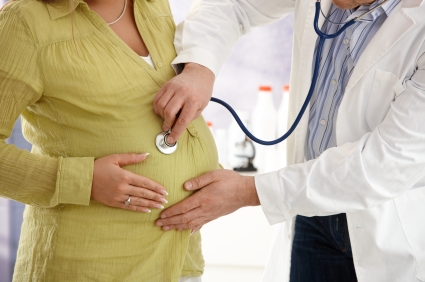If you find yourself bleeding or spotting during pregnancy, it’s more than understandable to feel scared and worried about what might be wrong. While there is no reason to panic over bleeding or spotting, these situations should still be taken very seriously during pregnancy. Any bleeding or spotting should be immediately reported to your doctor or midwife. You will most likely be asked to come in for an exam, even if the bleeding has stopped, to make sure there are no complications. If you have heavy bleeding or severe abdominal pain during pregnancy, you will want to go straight to the emergency room.
Spotting is very light bleeding that is a somewhat normal occurrence during pregnancy. Spotting is similar to a very light period, and may be pink, red, or brownish in color. Because of increases blood circulation during pregnancy, spotting can often occur after vaginal exams, Pap smears, and intercourse. You should always talk with your doctor or midwife if you have noticed spotting to make sure it is not an indication of a serious complication.
Bleeding or spotting in very early pregnancy may actually be implantation bleeding. This often occurs before a woman knows she is pregnant, about 10-12 days after fertilization. Because of this timing, implantation bleeding is often mistaken for menstruation. Implantation bleeding is light and will usually last for only a day or two.
Sometimes, bleeding or spotting can be a sign of miscarriage during the first half of pregnancy. Bleeding that is caused by a miscarriage will often be accompanied by abdominal pain or cramping. Most miscarriages occur before twelve weeks of pregnancy, although there are rare late miscarriages. Unfortunately, most miscarriages are not preventable in any way. Miscarriages are thought to be nature’s way of preventing an abnormal pregnancy or baby.
If you are more than halfway through your pregnancy, bleeding may be a sign of preterm labor. After 37 weeks, light bleeding that appears with mucus may be the “bloody show†that often occurs before or during a normal labor.
Early pregnancy bleeding or spotting may also be a sign of an ectopic pregnancy, when the fertilized egg implants itself in the fallopian tube. This type of bleeding is often accompanied by pain and cramps. Ectopic pregnancies can cause a fallopian tube to burst if it is not detected early enough. Ectopic pregnancies occur in less than two percent of all pregnancies.
Bleeding or spotting can also occur if you have a vaginal infection or a sexually transmitted disease. This type of bleeding will usually occur after vaginal exams, Pap smears, or intercourse. If this is the cause of your bleeding, you will probably need to be observed carefully to make sure there are no further complications during your pregnancy.
Bleeding is also a sign of placenta previa, when the placenta covers all or part of the cervix. In early pregnancy, this problem may correct itself. In late pregnancy, a cesarean section is usually scheduled because of the potential risks to mother and baby.
Placental abruption can also cause bleeding during pregnancy. This condition is when the placenta separates from the uterus. Placenta abruption usually occurs in the last trimester of pregnancy and can be dangerous to the mother and baby. It occurs in less than one percent of all pregnancies.
You and your doctor or midwife may not be able to find a clear explanation for any bleeding or spotting that may occur during your pregnancy. Many women experience bleeding and spotting for a few days or weeks and go on to have a perfectly healthy baby. In any case, your doctor or midwife will probably recommend that you cease certain activities and get some rest, and perhaps even go on bed rest for a while, if you have experienced bleeding or spotting during your pregnancy.

